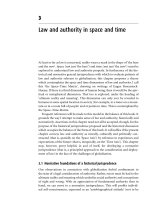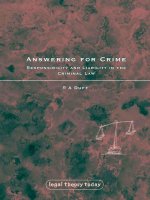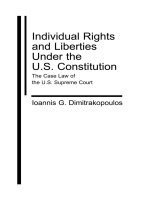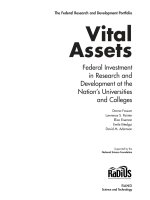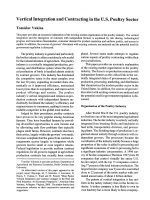UCDC Law Syllabus Fall 2011 Law and Lawyering in the Nation’s Capital
Bạn đang xem bản rút gọn của tài liệu. Xem và tải ngay bản đầy đủ của tài liệu tại đây (136.36 KB, 16 trang )
UCDC Law Syllabus
Fall 2011
Law and Lawyering in the Nation’s Capital
Wednesdays, 6 to 9 p.m. (except as noted)
Auditorium
University of California Washington Center
1608 Rhode Island Avenue, N.W.
Washington, D.C. 20036
Instructors:
Nicole Lehtman, UCDC Law Program Director
(202) 974-6392
Myron Dean Quon, Lecturer
(202) 670-4681
Gretchen M. McMullen, Lecturer
(202) 265-2161
Program Description:
Your externship in the UCDC Law Program has two main components: the lawyering you
do at the externship site, guided by your externship supervisor, reflected upon in your
journal and monitored and supported by your instructor; and the companion course, a
3-credit seminar with frequent guest speakers, class discussion and a final paper by each
student on a legal topic relevant to the externship.
The seminar is designed to enhance your externship experience in three principal ways.
First, we will learn about the process of federal lawmaking and the impact it has on
business as well as our daily lives directly from leading government lawyers, lobbyists,
and public interest advocates. Second, we will investigate the unique role of lawyers,
across a range of subject areas and ideologies, in making and changing federal law and
policy. And third, we’ll explore career opportunities unique to lawyering in Washington,
even as we enhance your skill set for success on any career path. Underlying all these is
our intention to put you in touch with the wisdom, and the professional values, of
America’s most dedicated public law practitioners.
Class sessions generally include guest speakers and discussion based on your questions.
Many of our sessions will include a “grand rounds”-style exchange to facilitate peer-topeer learning about lawyering at the broad range of externship sites. Each student will
write a final paper, typically on a legal topic selected in consultation with the instructor
and the externship supervisor for educational value and salience to the office. The final
classes of the term will feature presentations on your externships or your papers in
progress.
From time to time we will also have optional events outside of class. These will be
announced in advance.
Seminar requirements:
Your seminar grade will be based on:
Class participation (25%). This includes your attendance, class participation,
active engagement with our guest speakers, and presentation on your externship
or paper in progress. One of the greatest benefits to this course is your sharing
of your experiences with one another, to which we will devote some part of
every class. So bring your stories, observations, troubles and hopes. We will
create space for discussion of any specific issues you would like to raise. If you
have to miss a class, please advise your instructor.
Journal entries and timekeeping (25%). Journals include two types of records:
personal reflections on your externship experience, and guided entries on topics
to be announced, like ethical requirements and challenges, office or agency
management, and the place of law reform in the office’s work. Guided journal
entries are specifically noted in this syllabus; the other entries, the bulk of your
journal-keeping, will be your record of the externship and your learning, and
your personal reflections on the experience as it unfolds.
You should observe the confidentiality and privilege rules of your placement host
organization and of the D.C. Bar, which generally means you should omit
information that could identify an individual client or breach an agency’s
deliberative process privilege. We are here to help you resolve any questions you
may have on this and other subjects.
Timesheets are a close equivalent of billable hour logs, and should be kept even
more contemporaneously than journals. Just keep a window open on your office
computer and jot down time and tasks several times a day. Don’t let yourself get
behind, as well-kept timesheets are hard to reconstruct.
Journals are shared privately with your instructor every two weeks for individual
feedback; expect to write about 3-4 pages for each two-week period.
Timesheets, on the other hand, can be shared with your supervisor. Journal and
timesheet due dates are the same: every other Wednesday, starting September
7, for the preceding two full weeks. Separate UCDC Law memos offer guidelines
on journal-keeping and timekeeping, and answer some common questions.
Journal and timesheet due dates for fall 2011:
September 14
September 27
October 12
October 26
November 9
November 23 (feel free to submit early since this is Thanksgiving week)
December 7
Final paper (50%). As guidelines for your own progress, and to allow time for
your instructor’s assistance, expect to hand in a topic statement with reading list
by October 14; a draft or outline by November 16; and the final paper by
December 16.
Externship requirements:
Timesheets/hours: Successfully complete hours as determined by your home
school. Berkeley, Davis and Irvine require 560 hours or more over a minimum of
14 weeks; UCLA requires 14 full weeks of five days each, except for holidays
when the office is closed. If you have to miss a day or more at the placement,
see me. Send your timesheets to every other Wednesday, on the
same schedule as your journals. See timekeeping guidelines for details.
Receive a satisfactory evaluation from your supervisor at the end of the
semester.
Meet your supervising attorney’s expectations for attendance, performance and
professionalism.
Complete the final evaluation form about your placement.
Office hours: I do not have specific office hours, but I am available to meet with you during the
week and am always happy to schedule a meeting or phone call on any subject that you
would like to discuss.
Course materials: There is no casebook, but there will be occasional handouts and assigned
readings that you can obtain on the Internet, Westlaw, or Lexis. For document
repository, scheduling and other functions this term, we will be using Google Docs,
www.docs.google.com.
Please feel free to let me know if you have questions or tips to improve our use of these
electronic aids.
UC Washington Center events: UCDC Law students are warmly invited to all UC Washington
Center Forums, most Mondays at 6:30 p.m. in the Center’s first floor auditorium. The
Forums feature talks and Q & A with a wide range of Washington notables, and are
typically publicized around the building ahead of time. See www.ucdc.edu for a
schedule.
Class One: Wednesday, August 31, 5-9:00 p.m.
Auditorium – First Floor UCDC Building
Introduction to the UC Washington Center and the Seminar; and Program Orientation
We will introduce ourselves and our externship placements, discuss foundational
questions for the seminar, review course requirements and expectations. Discuss the
benefits of journaling.
We’ll get a briefing about Center facilities, including essential logistics (building access
and services, student use of the fitness room, the Monday night “Center Forum” lecture
series, etc.). And we’ll have our ID pictures taken and ID cards before class.
Class Two: Wednesday, September 7, 6-9:00 pm
Auditorium
Louis Ramos, Compliance Investigation Lead, Pfizer Inc. Mr. Ramos is a member of
Pfizer’s Corporate Compliance Division - International Investigations Team where he
serves as the Investigations Lead for Latin America. Mr. Ramos is responsible for
international compliance investigations involving research and manufacturing issues.
Mr. Ramos is also responsible for all compliance investigations for Pfizer, Inc. in Latin
America involving the Foreign Corrupt Practices Act, local anti-kickback laws,
pharmaceutical regulations, antitrust regulations, and other compliance issues
including conflicts of interest, improper payments, misappropriation of corporate
assets and related fraud. Mr. Ramos will explore with you the role an attorney plays
at a publicly held company in complying with US mandated regulations, laws, and
statutes; and how the company works within those constraints on a day-to-day basis.
Prior to joining Pfizer Mr. Ramos was a Partner in the Washington, DC office of DLA
Piper LLP, where he was a member of the White Collar, Corporate Crimes and
Investigations practice group. Mr. Ramos has represented pharmaceutical, health
care and financial services clients in internal and government investigations involving
alleged violations of the Foreign Corrupt Practices Act, the False Claims Act, off-label
promotion, anti-kickback statutes, good research and manufacturing practices,
money laundering, and bank fraud.
Before returning to private practice, Mr. Ramos served for almost six years as an
Assistant United States Attorney in the District of Columbia. Mr. Ramos was the lead
federal prosecutor in 19 jury trials and over 30 bench trials, and he directed
numerous grand jury investigations into violations of federal and local criminal laws
including mail and wire fraud, money laundering, counterfeiting, narcotics
trafficking, human trafficking and other crimes of violence. Mr. Ramos successfully
briefed and argued on behalf of the United States an issue of first impression before
the United States Court of Appeals for the District of Columbia Circuit.
While at the Department of Justice, Mr. Ramos received United States Department
of Justice Special Achievement Awards for Sustained Superior Performance in 2004
and 2006, and a commendation from the United States Secret Service in 2008.
After graduating from law school Mr. Ramos was a litigation associate for 5 years at
the Washington, DC office of Fried, Frank, Harris, Shriver & Jacobson. Mr. Ramos is a
graduate of the University of Pennsylvania Law School and Cornell University.
Class Discussion: Setting goals and designing and managing your externship
experience. With the MacCrate Report and your own values as a guide, come
prepared to talk about your personal goals for the externship, and any obstacles you
anticipate to achieving them. We will brainstorm strategies for overcoming those
obstacles, including developing your lawyering skills, managing your own work, time,
and interactions with the office, managing your superior(s), matching your interests
to your work, obtaining important assignments and more. Use our conversation to
help you with your “goals memo,” due as part of the journal entries you’ll submit by
Wednesday, September 14.
Reading: Review Chapter 5 of the Report of the ABA Section of Legal Education and
Admission to the Bar, Legal Education and Professional Development: An Educational
Continuum (1992), popularly known as “The MacCrate Report” after Robert
MacCrate, chair of the Report task force:
www.abanet.org/legaled/publications/onlinepubs/maccrate.html. Scroll down to
Chapter 5, “Statement of Fundamental Lawyering Skills and Professional Values,”
which gives the authors’ assessment of the most important legal skills and values a
lawyer can possess.
Class Three: Wednesday, September 14, 6-9 pm
Auditorium
Michael Levy, UC Berkeley Law Library Associate Director, Advanced Legal Research.
Mr. Levy will guide us through a variety of research techniques and resources that are
either especially useful to Washington lawyering or uniquely found here. He will be in
California, linked to us by conference phone and video link to his computer screen. He
will discuss the history of superseded legislation, administrative law, codifications, and
resources available both with and without charge. His talk will include answers to your
research questions (see below).
Questions: Mr. Levy will try to answer on the spot whatever questions we may have for
him, but he has asked us to submit as many as we can in advance, by 5 p.m. Eastern time
on Monday, September 12. What do you want to know how to do? What research
needs does your externship office have? By all means consult with your externship
supervisor in devising questions; try to make them broad enough that your fellow
students will be interested in the answers.
Class Discussion: How to get the most out of supervision and elicit constructive
criticism from your supervisors. Let’s talk about how to get good supervision from your
supervisor. How can you ensure you are getting what you need out of the externship?
Also how can you increase your chances of receiving useful constructive criticism so that
you learn as much as possible during you time at your workplace?
Guided Journal Due: Goals memo due. This journal entry should be in the form of a
Memo that you will submit to your supervisor with a cc to me and your Professor. You
should include in this Memo your goals for the externship. Your goals should be specific,
i.e., not “I hope to get real work experience.” Please explain how you plan to achieve
these goals, and exactly what steps you plan to take to help you succeed in achieving
these goals. Feel free to include not only projects that you would like to do at work but
other activities that you may want to get involved with while in Washington DC. Give
some thought to both professional and personal goals: What do you hope to learn and
discover? How do you hope to improve or enrich yourself this term, as a person and as a
professional?
Class Four: Wednesday, September 21, 6-9 p.m.
Auditorium
Barbara ("Bobby") Kammerman. Bobby Kammerman is a Senior Attorney Advisor for
the Department of Justice’s Professional Responsibility Advisory Office (PRAO). PRAO
provides advice to government attorneys and the leadership at the Department of
Justice on issues relating to professional responsibility. The office provides coordination
with the litigating components of the Department to defend Department attorneys and
Assistant United States Attorneys in any disciplinary or other hearing where it is alleged
that they failed to meet their professional responsibility obligations. PRAO serves as
liaison with the state and federal bar associations in matters related to the
implementation and interpretation of 28 U.S.C. 530B (the Ethical Standards for Attorneys
for the Government Act) and any amendments and revisions to the various state rules of
professional conduct.
Ms. Kammerman started her career in private practice in Washington, D.C., where she
mainly represented criminal defendants. She went on to serve as counsel to
Committees of the United States Senate and the House of Representatives.
At the Department of Justice, Ms. Kammerman prosecuted criminal civil rights cases
throughout the nation. She also served as Coordinator and then Director of the United
States Attorneys Fair Housing Program, while she worked at the Department’s Housing
and Civil Enforcement Section of the Civil Rights Division. There, she provided training
and advice to Assistant United States Attorneys who were handling cases under the Fair
Housing Act. She has tried and supervised the trials of several landmark fair housing
cases throughout the United States. While at the Civil Rights Division, Ms. Kammerman
was the Professional Responsibility Officer, providing training and advice on a variety of
ethical issues that arose in the context of civil litigation. Also, from 1996 to 2001, Ms.
Kammerman served on the Rules of Professional Conduct Review Committee of the D.C.
Bar.
Ms. Kammerman has been at PRAO since it opened on April 19, 1999. First as a Senior
Legal Advisor, then as Deputy and Acting Director, and now again as Senior Legal Advisor,
she advises and trains Department of Justice lawyers (including Assistant United States
Attorneys) about their ethical responsibilities as lawyers.
For more than twenty years, Ms. Kammerman has taught trial advocacy and ethics for
continuing legal education programs, including the Attorney General's Advocacy Institute
and the National Institute for Trial Advocacy.
Ms. Kammerman will discuss the Canons of Professional Responsibility including
confidentiality, conflicts of interest, contact with represented parties – and other
principles which you should be sensitive to in your roles as externs and beyond. Ms.
Kammerman will also address specifically how these responsibilities relate to
government attorneys.
Discussion: Have you encountered any ethical issues in your externship or previous
work? What are some of the situations that you have been faced with? They do not
necessarily have to be huge ethical dilemmas – often the biggest ethical pitfalls are small
issues that you do not realize can have large ethical implications. How did you work
through these issues? Are there special obligations associated with the role that require
lawyer to be leaders? What are some of the Professional Ethical considerations that
lawyers should practice?
Reading:
1. Luban and Rhode, Legal Ethics (4th Ed.), The Advocate’s Role in an Adversary System:
Neutral Partisanship pp. 136 -211.
2. David Luban, Lawyers: A Critical Reader (Richard l. Abel ed.1997); The Adversary
System Excuse.
3. The Fundamental Dilemma of Lawyering: the Ethics of the Hired Gun.
4. Judge Eric Bruggink, Speaking the Truth, ABA Public Contracts Section Symposium in
Colorado Springs, Colorado (1998).
Class Five: Tuesday September 27, 6-9 pm (note change of day)
Speaker: Sharra E. Greer, policy director at Children’s Law Center. Ms. Greer joined
Children's Law Center as its first policy director in 2008. Ms. Greer brings extensive
policy experience with her to this new position as she developed the policy
department at Servicemembers Legal Defense Network (SLDN). In addition to
creating and supervising that policy department, she supervised the group’s
successful legal services and impact litigation efforts. Ms. Greer began her legal
services work while at Rutgers Law School, when she worked at Camden Regional
Legal Services. After law school, she was an associate with the firm of Weissman &
Mintz, specializing in plaintiffs’ side employment discrimination and labor law. Ms.
Greer left Weissman & Mintz to serve as a staff attorney with the National Veterans
Legal Services Program (NVLSP). There, Ms. Greer worked on cases before the Court
of Appeals for Veterans Claims and represented plaintiffs’ in two class actions
through NVLSP’s Agent Orange Resource Center. Recently, Ms. Greer helped design
and create Lawyers Serving Warriors, a program which provides pro bono legal
services for returning veterans of Iraq and Afghanistan. Ms. Greer graduated with
honors from Rutgers University and received her BA from the University of
Washington.
Discussion: Let’s talk about the mission of your organization. What is the mission of
your organization? How does the mission play out at your workplace, amongst the
staff and members of your organization? Is the mission consistent with what you
thought it would be?
Guided Journal Due: Supervisor Reaction. Discuss your meeting with your supervisor
regarding your goals memorandum. Reflect on that conversation. How did you feel
asking your supervisor to review the memo? Did your supervisor provide feedback or
comments about your goals? Did anything interesting come out of the meeting?
Class Six: Wednesday, October 5, 6-9 pm
Speaker: William E. White is a partner at the law firm of Akin Gump Strauss Hauer
and Feld. Bill White focuses on the representation of corporations and individuals in
Securities and Exchange Commission (SEC) enforcement investigations, as well as
related criminal investigations, internal investigations and securities litigation. Over
the years, Mr. White has led or had a senior role in leading dozens of high profile
securities matters. Most recently Bill White was co-trial counsel in the case of
United States v. Raj Rajaratnam. This trial was ground breaking in the manner in
which the United States government prosecuted this insider trading case by
primarily relying on wiretaps. The conviction of Rajaratnam marks the highest profile
conviction of a corporate figure since Enron. Bill White will talk about the defense of
Rajaratnam and some of the considerations in litigating a case against the United
States, as well as the effect that this new trend in insider trading cases may play in
future prosecutions.
Discussion: Diversity and Difference in the Legal Profession.
Reading: Lecture: ‘A Latina Judge’s Voice,’ N.Y. TIMES (May 15, 2009)
For Sotomayor and Thomas, Paths Diverge at Race, N.Y. TIMES (June 7, 2009)
Debate on Whether Female Judges Decide Differently Arises Anew, N.Y. TIMES (June
4, 2009)
Ginsburg: Court Needs Another Woman, USA TODAY (May 28, 2009)
The Empathy Issue, N.Y. TIMES (May 29, 2009)
Is there a Conflict Between Empathy and Good Judging?, LA TIMES (May 28, 2009)
In a ‘Different’ Voice, SLATE (June 10, 2009)
The Place of Women on the Court, N.Y. TIMES (July 7, 2009)
Week of October 11: One-on-One (please sign up) meetings will be individually scheduled
in advance of the Program Director’s midterm meetings with externship supervisors. This is
your chance to discuss specific issues or problems with your instructor(s), in confidence, before
our visit to your externship site. It is also our chance to prepare you for the portion of the site
visit in which we sit down with you and your placement host together, to explore what we
would all like the overall experience and its outcomes to be. We schedule these meetings by
sign-up for half-hour slots at my office.
Class Seven: Wednesday, October 12, 6-9 pm
Speaker: James F. Flug, Senior Fellow, Harvard Law School, and former chief counsel
to the late Sen. Edward M. Kennedy. Jim Flug first served as counsel to Sen.
Kennedy from 1967 to 1973, following service as law clerk to Chief Judge Bazelon of
the D.C. Circuit, special assistant to the head of the DOJ tax division, and
confidential assistant to Attorney General Katzenbach. As head of the National Legal
Aid and Defender Association from 1973 to 1975, he helped secure the adoption
and implementation of the 1974 Legal Services Corporation Act, funding legal aid to
the poor. Then he headed Energy Action, challenging oil companies and the Carter
administration on energy issues during the 1970s oil crisis. In 1979-80 he served in
Sen. Kennedy’s presidential campaign as special counsel, Maryland state director,
and convention press secretary. From 1980 to 2003, he practiced “private public
interest law,” helping state governments seeking a share of oil company overcharge
refunds, representing the generic drug industry against pharmaceutical giants, and
taking on many other clients and causes. He returned to Capitol Hill as Sen.
Kennedy’s chief counsel from 2003 to 2006. Mr. Flug was a fellow at the Institute of
Politics at Harvard’s Kennedy School of Government in 2006, and visiting associate
professor of law and acting director of the Federal Legislation and Administrative
Clinic at Georgetown University Law Center in 2008. He was a distinguished visitor
and lecturer at Harvard Law School in 2006-2007 and again in 2009-10. In 2009 and
2010 he directed Harvard Law School’s Washington Semester, where he taught the
companion course, “Government Lawyering—Policy and Practice.” He holds an A.B.
from Harvard College and an LL.B. from Harvard Law School.
Mr. Flug will lead us in conversation, from his own first-hand knowledge, about the
role of Washington’s centrally important yet little understood senior professional
staff, both executive and legislative. To what extent, how and why are the nation’s
policies shaped by these remarkable people, in the names of their principals but
using their own wisdom and judgment? Of what does that wisdom and judgment
consist, and how is it exercised under the given conditions? What are the traditions
and taboos of these roles, and why might a lawyer of ability and ambition prefer
such a position to a more public one, or find it a better route to effectiveness?
Discussion: Professionalism, Networking, Communications Skills.
Reading: Hermina Ibarra and Mark Hunter, Managing Yourself: How Leaders Make
and Use Networks, Harvard Business Review, January, 2007, pp 1 -8.
Ailes, Roger, You Are The Message, Getting What You Want By Being Who You Are,
Doubleday, 1995. Chapter One, The First Seven Seconds, pp. 1- 12; Chapter Three,
You Are the Message, pp. 19 – 40.
Deborah Tannen, Talking From 9 to 5: How Women’s and Men’s Conversational Styles
Affect Who Gets Heard, Who Gets Credit and What Gets Done At Work (selections)
Sue Bryant & Jean Koh Peters, Five Habits: Building Cross-Culture Competence in
Lawyers, Clinical Law Review, Vol. 8, Issue 1 (Fall 2001), pp. 33-108 (selections)
Journal Due: Please use this week’s journal to reflect on the past week of your
externship. Please use this exercise as reflection and not just a mere regurgitation of
what you did during the week which is what you do in your timesheets.
Paper topic statements: Due Friday, October 14
Compose a one-to-two-paragraph statement of your paper topic and how you hope to
develop it. You should include at least the start of a reading list for the paper. Feel
encouraged to choose your topic in consultation with your externship hosts and with your
instructor; but remember the paper has to be your own work and should not duplicate
research or writing you are otherwise doing in the placement.
Class Eight: Wednesday, October 19, 6-9 pm
Auditorium
Robert Raben, President and Founder of the Raben Group. Robert aggressively
bipartisan approach was honed during a highly respected legislative career that began
on Congressman Barney Frank’s (D-MA) staff and culminated in House Judiciary
Committee Chairman Henry Hyde’s (R-IL) endorsement of his appointment to the Justice
Department as Assistant Attorney General for Legislative Affairs.
Robert served as counsel to Congressman Frank for seven years, advising Mr. Frank on
issues before the Judiciary Committee and on national civil rights policy and politics. The
quality of his work soon carried him onto the Committee itself as Democratic counsel for
the Subcommittee on the Constitution. He later held that position on the Subcommittee
on Courts and Intellectual Property, advising members on copyright, property and
trademark law and policy, as well as the federal judiciary. In 1999, he was appointed
Principal Deputy Assistant Attorney General and, subsequently, Assistant Attorney
General. After a unanimous confirmation vote, Robert was charged with overseeing
Attorney General Janet Reno's legislative initiatives and handling extensive congressional
oversight of the Department. He dealt extensively with both chambers of Congress and
both sides of the aisle as chief lobbyist and strategist on a range of issues, including
intellectual property, federalism, tort reform and cybercrime.
After graduating from the Wharton School of the University of Pennsylvania and New
York University School of Law, Robert was an associate with the law firm Arnold & Porter,
specializing in international trade, federal lobbying and white-collar criminal defense.
Soon after, he joined the faculty of Georgetown University Law School as an adjunct
professor - a position he held until his confirmation as Assistant Attorney General.
He is a past president of the Hispanic Bar Association of DC and currently heads the
organization’s judicial endorsements committee. He serves on the boards of the
American Constitution Society and Alliance for Justice.
Mr. Raben will discuss the role that lobbying plays in the political landscape as well as
how lobbyist shape legislation and public policy while working to further their
individuals clients goals. Mr. Raben will address what it really means to be a “lobbyist”
and the transition from traditional attorney to “lobbyist.”
Discussion: Role and Influence of Lobbyist in Washington DC. Good, bad, necessary, or
indifferent.
Reading: TBA
Class Nine: Wednesday, October 26, 6-9 pm
Auditorium
Andrew Tannenbaum , National Security Agency, Deputy General Counsel. Mr.
Tannenbaum is the Deputy General Counsel for Cyber at the National Security Agency.
In this role, he is responsible for overseeing the agency’s legal practice with respect to
cyber security and legislative matters.
Mr. Tannenbaum previously served as Senior Counselor and Assistant General Counsel in
the White House Office of Management and Budget, where he was responsible for
coordinating White House review of executive orders and other Presidential
memoranda. Prior to his time in the White House, Mr. Tannenbaum served in various
positions in the Department of Justice. From 2009 to 2010, he was Deputy Director of
the Guantanamo Review Task Force, where he managed the process to review the status
of all Guantanamo detainees pursuant to President Obama’s executive order. Prior to
that, he served as Counsel to the Assistant Attorney General for National Security. From
2002 to 2007, Mr. Tannenbaum was a trial attorney in the Department of Justice’s Civil
Division, where he served as lead counsel for the government in litigation involving
constitutional and other challenges to federal statutes, policies, and programs. Mr.
Tannenbaum also worked on national security matters for the Department’s Office of
Legal Counsel in 2004.
Before joining the Department of Justice, Mr. Tannenbaum was an associate at Davis
Polk & Wardwell in New York and clerked for the Honorable Wilfred Feinberg of the
United States Court of Appeals for the Second Circuit. Mr. Tannenbaum graduated from
Columbia Law School in 2000 and from Dartmouth College in 1997.
Discussion: Mid-term update of your placements. We will talk in more detail about
issues or concerns in your placement. Are you are on track to achieve your goals. What,
if anything, is holding you back? How is the communication at your placement –
between you and your supervisor and other staff members?
Guided Journal Due: Use this Journal to reflect on whether you are accomplishing your
goals that you set for yourself in your goals memorandum. Thinks about whether you are
actively working towards your goals, are there goals that have fallen to the wayside?
Analyze whether the goals you set were realistic, practical, or useful. Establish concrete
steps of how you will accomplish your remaining goals between now and the end of the
semester.
Class Ten:
Wednesday, November 2, 6-9 pm
Auditorium
Ilana Brunner serves as the Legislative Director for Congressman Robert C. “Bobby”
Scott, who represents the Third Congressional District of Virginia. She advises the
Congressman on a wide range of matters including issues pertaining to his seats on
the House Education and Workforce Committee and the House Judiciary Committee.
In particular, she is recognized for her work in the areas of education, civil rights,
juvenile justice and church/state separation.
Prior to working on Capitol Hill, Ilana spent two years as Litigation Counsel for
Americans United for Separation of Church and State. She also spent four years in
private legal practice in Washington, DC and co-authored an article on employment
practices that was published in the National Law Journal.
Ilana received a B.A. with honors in Political Science from the University of California
at Irvine in 1994, and she spent one year studying politics and international relations
of the Middle East at Hebrew University in Jerusalem, Israel. In 1998, she received
her J.D. with a concentration in Public Law from Cornell Law School, where she was
an Editor on the Cornell Journal of Law and Public Policy.
Discussion: Government and Public Interest Lawyering
Reading: Alan W. Houseman & Linda E. Perle, Securing Equal Justice For All: A Brief
History of Civil Legal Assistance in the United States, a publication of the Center for
Law and Social Policy (Revised January 2007) – skim for background on legal services
history.
Douglas McCollam, The Ghost of Gideon, The American Lawyer (March 2003).
M. Coombs, Your Money or Your Life: A Modest Proposal for Mandatory Pro Bono
Service 249-252, in Lawyers: A Critical Reader (Richard L. Abel ed. 1997).
Pat Wald, Whose Public Interest Is it Anyway? Advise for Altruistic Young Lawyers. 47
Me.L. Rev.3 (1995)
Catherine J. Lanctot, The Duty of Zealous Advocacy and the Ethics of the Federal
Government Lawyer: The Three Hardest Questions, 64 S. Cal. Rev. 951, 951-967
(1991).
Class Eleven: Wednesday, November 9, 6-9 pm
Amy Howe, is a Partner at the law firm of Goldstein and Russell,
in here in Washington DC. Goldstein and Russell is a premier
law firm in DC whose focus is solely on US Supreme Court practice. They appear in one
out of every ten cases before the Supreme Court on the merits. Moreover, Thomas
Goldstein, the founder and one of the named partners, is the creator of SCOTUSblog.
Amy serves as the editor of SCOTUSblog which can be found here:
. Amy Howe has served as counsel in over two dozen merits
cases at the Supreme Court, including matters involving criminal law, the death penalty,
the First Amendment, bankruptcy, and the Americans With Disabilities Act. She also has
served as counsel in numerous petitions for certiorari, briefs in opposition, and amicus
briefs. Amy has argued two cases before the Supreme Court. Amy has been a lecturer
in law at Stanford Law School, where she has co-taught the Supreme Court Litigation
Clinic, and has co-taught the Supreme Court Litigation class at Harvard Law School.
Amy has a special interest in the death penalty, international law, and international
human rights and has consulted on numerous briefs relating to those issues in both the
Supreme Court and the lower courts. From 2001 to 2004, she was an adjunct professor
at American University's Washington College of Law, specializing in international human
rights litigation in U.S. courts.
Prior to joining the firm, Amy was an associate in the litigation and international groups
at Steptoe & Johnson LLP.
Journal Due: Please use this week’s journal to reflect on the past two weeks of your
externship.
Draft or Outline of Paper: Due Friday, November 18
A draft or outline of your final paper should be sent to by Friday,
November 18. This deadline is designed to give you a head start, help you identify
opportunities or challenges in research or writing, and enable you to get your
instructor’s help, minor or major, while there’s still time. Keep in mind that a good paper
for this course could be a terrific writing sample.
Class Twelve-Fourteen: Wednesday, November 16, 30, and December 7
(evaluations)
Schedule: We will not meet the Thanksgiving week.
Presentations. In our last three classes, each of you will make a 10-to-15-minute oral
presentation about your externship or your final paper in progress, with questions from
your fellow students in the small section. Treat this exercise as if it were a presentation
of a case or project in a meeting among colleagues interested in your work. If you wish,
you can use any capabilities of our “smart podium” or hand out materials in class.
November 23 (Journal Due but no class this week)
Guided Journal Due: Discuss the atmosphere in the office. Are you comfortable in
that setting? What is it that makes you comfortable or uncomfortable? Can you see
yourself in this setting? What is it specifically that you like or do not like? What has
your current office taught you about what you will look for in the future? Have you
noticed anything interesting about how people interact in your office; anything about
office hierarchy; style of management?
December 7 (Last journal entry)
Guided journal due: Final Reflection. How has this externship affected your career
plans, if at all? Was the externship useful in teaching you the aspects that you like or
dislike about being an attorney? What did you learn about yourself during the
semester? Have you changed any of your future career plans as a result of your time in
Washington? Sum up with care what you have seen and learned; make these the
thoughts and reflections you will be glad you put down while they were fresh.
Final papers: Due December 16
